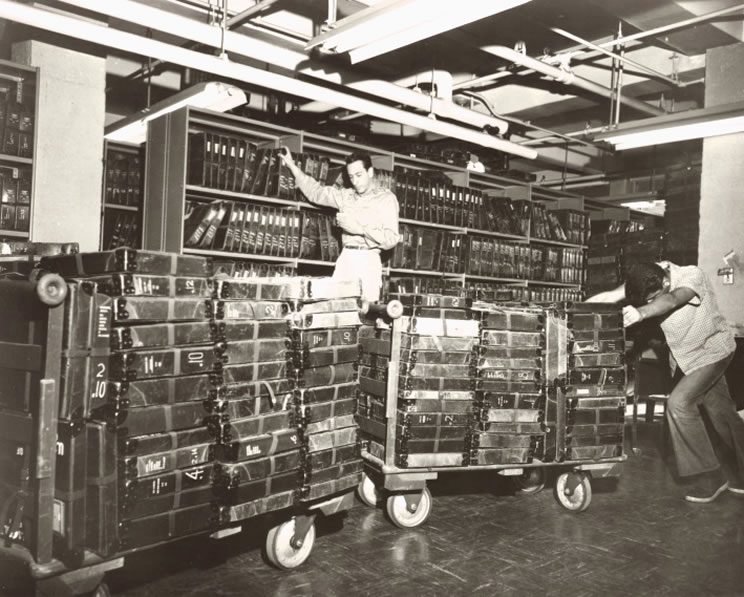Image Description: In the shipping department at the Library for the Blind, New York Public Library, Talking Book records are being mailed in their containers. In the foreground, a man pushes two trolleys full of Talking Book records. In the background a man stands on a ladder in front of one of the many large metal shelves housing the containers.
Partnerships are powerful! Since its inception in 1921, the American Foundation for the Blind has worked with blindness organizations, government organizations, and private and commercial partners to improve the lives of those with vision loss. A singular example of this was AFB’s role in creating the Talking Book—the precursor to today’s audiobook.
On this day in history—May 15, 1945—the Library of Congress held a conference to discuss how to improve the growing field of assistive technology. This conference was attended by two organizations at the forefront of the creation of Talking Books—AFB and the American Printing House for the Blind. A wonderful example of a successful collaboration, the two organizations had shared technical information since the 1930s to bring books to the blind.
Over twenty years earlier, Robert B. Irwin, AFB’s visionary executive director, had begun to research the potential of audio recordings for those with vision loss. He reached out to the inventor of the long-playing record (LP), engineer and patent attorney Frank L. Dyer, to discuss its potential as a reading method for people who had lost their sight. Irwin correctly predicted that not since Louis Braille's invention of raised dots had a new idea been devised that would so greatly impact those with vision loss.
Next, he figured out the perfect material to use as an example of the new technology’s potential:
“I finally hit on a chapter about Mark Twain from Helen Keller's recent book, "Midstream." It has a style which I think will lend itself well to reading aloud, and because of the subject matter, and the reference to well-known persons early in the chapter, will I believe hold the interest.
By 1930, AFB was lobbying in support of a bill introduced by congressional representatives Ruth Baker Pratt and Reed Smoot to request funds to produce books for adults who were blind. The Library of Congress would administer the project. Helen Keller, employed by AFB, spoke to the House of Representatives in Washington D.C. on March 27, 1930.
Books are the eyes of the blind. They reveal to us the glories of the light-filled world, they keep us in touch with what people are thinking and doing, they help us to forget our limitations. With our hands plunged into an interesting book, we feel independent and happy.
The Pratt-Smoot Act passed in 1931, and the concept of “talking books” has only grown in popularity since then.
You can learn more about the history of AFB and Talking Books in our accessible online museum. Follow AFB on Facebook, LinkedIn, or Twitter to learn more about how we’re promoting inclusive technologies to this day.
